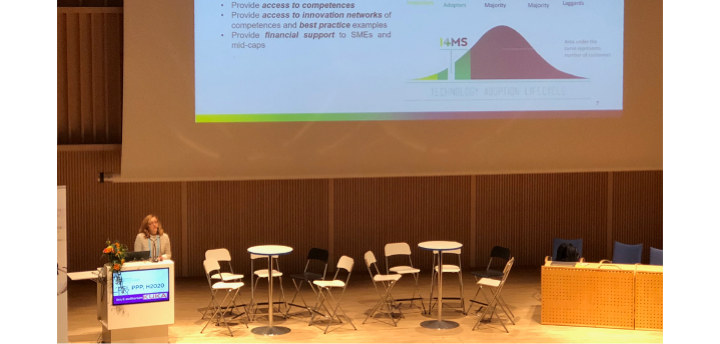Active participation of I4MS in European Robotics Forum
I4MS Initiative has had an active participation in European Robotics Forum (ERF) 2018 last week and leaded a workshop on Cascade funding for Robotics which was held on March, 14th and chaired by Mrs. Mayte Carracedo, coordinator of the current CSA (coordination and support action) of the Initiative.
The workshop, which awoke the interest of around 60 people, has included an introduction to I4MS Initiative, the intervention of EU-funded projects presenting their experience in providing support to SMEs which are developing or adopting robotic technologies and an overview on forthcoming cascade funding opportunities in the Robotics domain and on how to make the most out of them.
EUROC representative shared some of the lessons learned during the timespan of the project, which has just finished by the end of 2017, such as the advantages of introducing challenges as a project approach or the use of a simulation contest as a gateway. On their side, HORSE speaker showed and overview of the project and explain the focus sought by their open call, which closed recently. However, at ReConCell preferred to focus on the LOGICDATA pilot experiment and ROBOTTNET, which is the only of these projects that it’s not part of I4MS Initiative, shared the outcomes of their vouchers and pilots calls to promote innovation in Robotics.
After this presentation of well-advanced projects, PhD. Cécile Huet, Deputy Head of Unit Robotics & AI of the European Commission went through minimum requirements, good practices and contractual conditions of the financial support to third parties (FSTP), including a review of some forthcoming opportunities such as the ones from L4MS (in the field of Manufacturing/Factory), ROSIN and ROBMOSYS (both on Robot software components), ESMERA and RobotUnion (focused on SME support), COVR (Safety Certification – Shared facility) and EUROBENCH (which addresses on Bipedal Locomotion Benchmarking). She also mentioned that both the forthcoming call on Robotics Digital Innovation Hubs (€ 64 million) and the one for AI-on-Demand Platform (€ 20 million), include FSTP.
Next to this issue, Agnes Szeberenyi, from Ideal-ist network, explained how National Contact Points’ (NCP) Networks can help potential applicants to get access to cascading funding and beyond.
Closing the workshop, a debate arose among assistants on the best possible ways to raise awareness among enterprises, so that they can participate and benefit from these cascade funding open calls. Assistants also agreed on the need to create and disseminate good practices for the management of financial support to third parties, which could guide future projects.
This year’s edition of the ERF has brought together, under the theme “Robots and Us”, over 900 attendees from robotics academia and industry and hosted over 50 workshops cover current societal and technical themes, including human-robot-collaboration and how robotics can improve industrial productivity and service sector operations.
In 2019, European Robotics Forum will be held on March, 20th – 22nd, in Bucharest (Romania).


